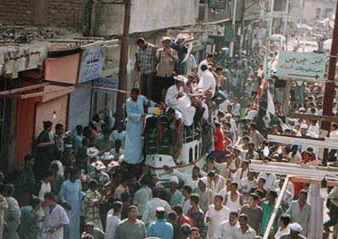|

Notation: This story represents original research by Jane Akshar, who's company, Flats in Luxor, is a member of the AETBI and offers apartments and Tours in Egypt.
A Moulid, meaning birthday in Arabic, is a celebration of a holy person and in Egypt these celebrations are held for saints of both the Islamic and Christian faiths. Most are Islamic and are governed by the Lunar Islamic Calendar. Though many consider these not to be proper customs, they are nevertheless popular traditions of the people. Probably the most important Muslim celebration is the Moulid el-Naby (the Prophet's birthday), which along with a number of other important Moulids is celebrated throughout Egypt. However, many others are more local in nature, such as the Moulid of Abu al-Haggag (Sheikh Yusuf al-Haggag) which is held in Luxor, where a mosque dedicated to him and dating to the 13th century may be found incorporated into the ancient Temple of Luxor.

Known as the Father of the Pilgrimage, al-Haggag was born in Damascus around 1150 AD and moved to Mecca in his forties before finally settling in Egypt. Yusuf al-Haggag lived many years in Luxor, establishing a zawiyah, before dying there in 1245 AD. Many of his descendents still live in the area.
According to local legend, the mosque of his name in the Temple of Luxor was probably not established by him. However, when a local official decided to rid the ancient temple of this mosque, Abu al-Haggag attempted to stop him. The government official nevertheless insisted that it be moved. Just before the mosque was to be torn down, however, the official woke up one morning to find that he could not move his body and apparently believing this to be the work of Abu al-Haggag, decided to change his mind about moving the mosque. Ever since then, the people of Luxor have had a special fondness for him and their mosque. His Moulid usually occurs during early November.
A combination of religion and entertainment, attending these festivals gives you a real picture of Egyptian life. These are local events, not put on for the tourists, although you are welcome to join in. The one in October celebrates a local Luxor saint and a great occasion for young and old alike. The children wear party hats which on closer inspection are made from crisp packets and other packing. They are very colourful and contain a noisy whistle contributing to the over all sound which is deafening.

Paul Sussman, of the Amarna Royal Tombs Project reports that:
" The Moulid (feast) of Abu Haggag happens at this time every year, and is wonderful fun. For days the streets of East Luxor have been filling with multi-coloured stalls selling sweets and toys and party hats, and tonight the town was jammed with revelers. There were impromptu bands playing on street corners, troupes of zikr dancers performing in booths along the roadside, crowds of people listening to itinerant preachers, children running around throwing firecrackers at each other. It was fascinating to witness, and to be part of. Everyone looked so impressive, the old men in their best galabeyas, the young children in their party hats. The great thing about working in Egypt is that its contemporary culture is every bit as rich and vibrant and fulfilling as its ancient one."
The procession has floats from many different guilds; here the boat guild and they are cheerfully bombarded with chickpeas, coins and water by the crowd. Every float is accompanied by either canned or live music. This tends to that of the region and you can hear Nubian and Saidi songs.

The whole town and surrounding district make it a day to remember. A family might save up all year in order to hire a caleche to be a part of the procession. Or they might decorate a camel. Although horse races are a part of the event, which stretches over several days you can also watch young men spurring their horses up and down before the main procession starts
The procession starts in the afternoon and once it gets going there is float after float with huge crowds accompanying each float. The many guilds include everyone from the felucca people to bakers to musicians,
There a serious part to the festivities as the idea is to be blessed by the saint as the procession passes by.

References:
This story represents original research by Jane Akshar, who's company, Flats in Luxor, is a member of the AETBI and offers apartments and Tours in Egypt.
|